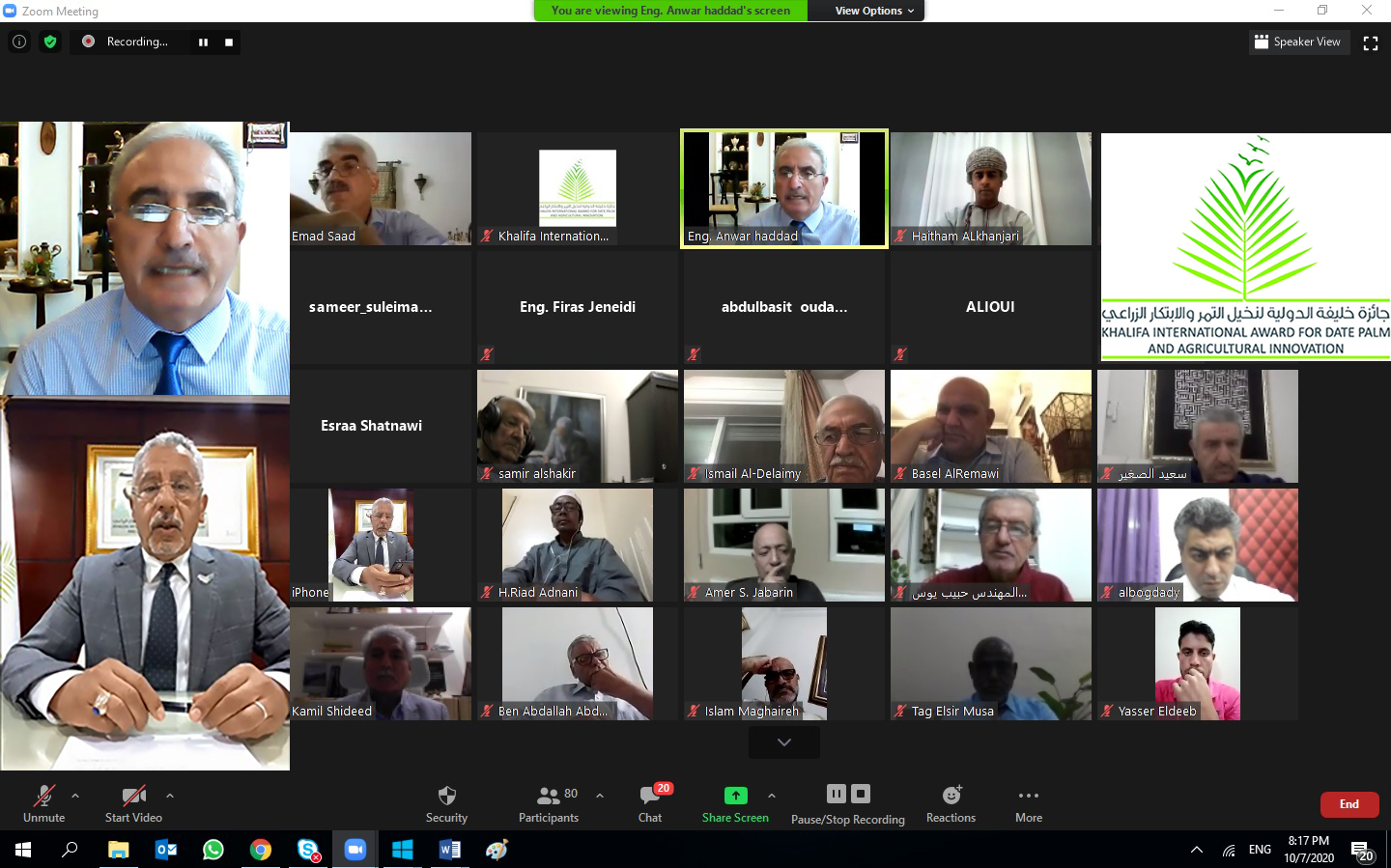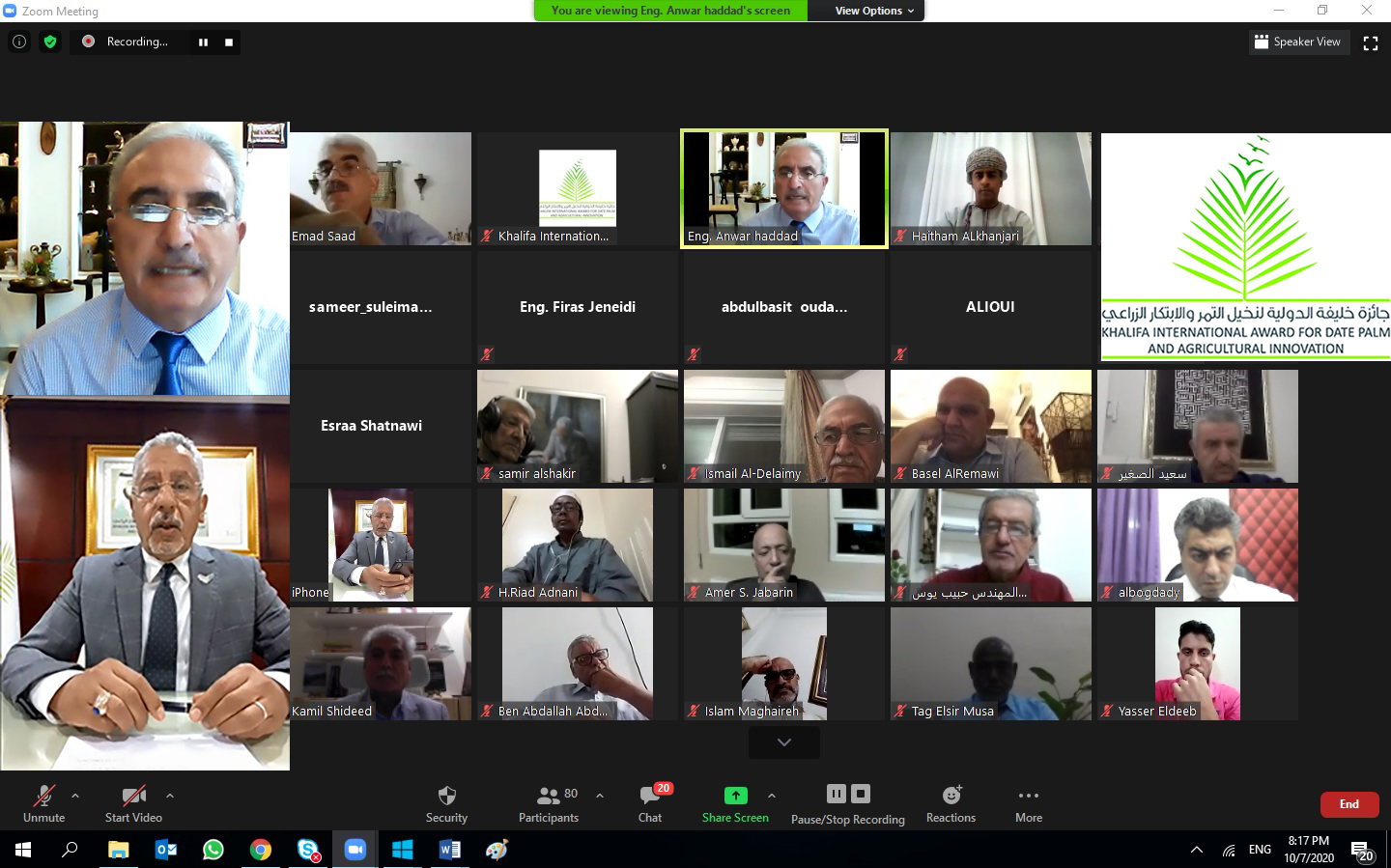
Award Program
Khalifa Award News
Abu Dhabi Date Palm Exhibition News
Egypt Festival News
Jordan Festival News
Sudan Festival News
Morocco Festival News
Mauritania Festival News
Mexico Festival News
Pakistan Festival News
International Conference News

“Khalifa International Award” proceeds with meeting experts and farmers
through the virtual lecture held on
The Jordanian Experience in Dates Production, modern cultivation and great competition.
- Throughout 20 years, the Date Palm cultivated areas, and the date production rate increases by 15 % per year.
- 14% is the Jordanian Dates share from the International market, and an average consumption of 3.3KG/ person yearly.
Khalifa International Award for Date Palm and Agricultural Innovation organized a virtual lecture, presenting “The Jordanian Experience in Dates Production”, by Eng. Anwar Haddad, Chairman of the Board of Directors of the Jordan Dates Association, on Wednesday the 7th of October, 2020. The lecture was attended by (97) participants, representing (12) Arab countries, among which are members of the Date Palm Friends Society in the UAE, farmers, and Agricultural experts.
This virtual lecture held via Zoom, comes under the directives of His Highness Sheikh Nahayan Mabarak Al Nahayan, Minister of Tolerance and Coexistence, President of the Award’s Board of Trustees, and within the Award’s framework and commitment to spread the scientific knowledge and awareness on the Date Palm Best Practices, and providing technical and scientific advice and support to farmers to help them improve the Dates quality. Dr. Abdelouahhab Zaid, the Award’s Secretary General, expressed his appreciation to the extended scientific and professional level by Eng. Anwar Haddad, as he is one of the significant agricultural advisors in the Middle East. Dr. Zaid, also embraced the scientific efforts made by Eng. Haddad, as the Chairman of the Board of Directors of the Jordanian Dates Association, and among the Award’s strategic partners and the Ministry of Agriculture in the Hashemite Kingdom of Jordan.
From his side, Eng. Anwar Haddad highlighted through the lecture the most important elements that contributed to the quality of the Jordanian dates, despite the short experience in date palm cultivation and date production, which does not exceed 20 years. The date palm cultivation in Jordan was based on a previous scientific study that began in 1995, where most of the seedlings were taken from reliable international sources of tissue culture, which in return developed a specific standard for the Jordanian dates. This is in addition to preparing a national strategy with the support of the Khalifa International Award for Date Palm and Agricultural Innovation, and a specialized study focusing on the localization of Jordanian dates in the international market towards creating a competitive branding image to the Jordanian dates, with the support of the (FAO).
Eng. Haddad, also added that the Jordanian farmers rely on two main varieties, the Barhi variety (13%) and the Mejhool variety (80%). The climate, humidity, temperature, high oxygen intensity and air pressure throughout the fruiting period in the Jordan Valley region helped increase farmers' demand for date palm cultivation, where the amount of investment reached more than half a billion Jordanian dinars during a significant period of time, and farmers were provided with needed financing. Highlighting also that more than 90% of date palm farmers are educated and holding academic degrees, the least of which is a Bachelor Degree. Moving forward, Eng. Haddad also listed some of the obstacles that face the Date Palm Cultivation sector, which included the shortage and quality of water, global competition and marketing, and high production costs in addition to pests and diseases.
Eng. Haddad, then concluded the lecture by highlighting that the volume of dates imports decreased from 17 thousand tons in 2014 to 13 thousand tons in 2018, and its value from 31 thousand dollars to 19 thousand dollars in the same period, while the rate of consumption increased from 2.3 kg to 3.3 kg per person.
a












